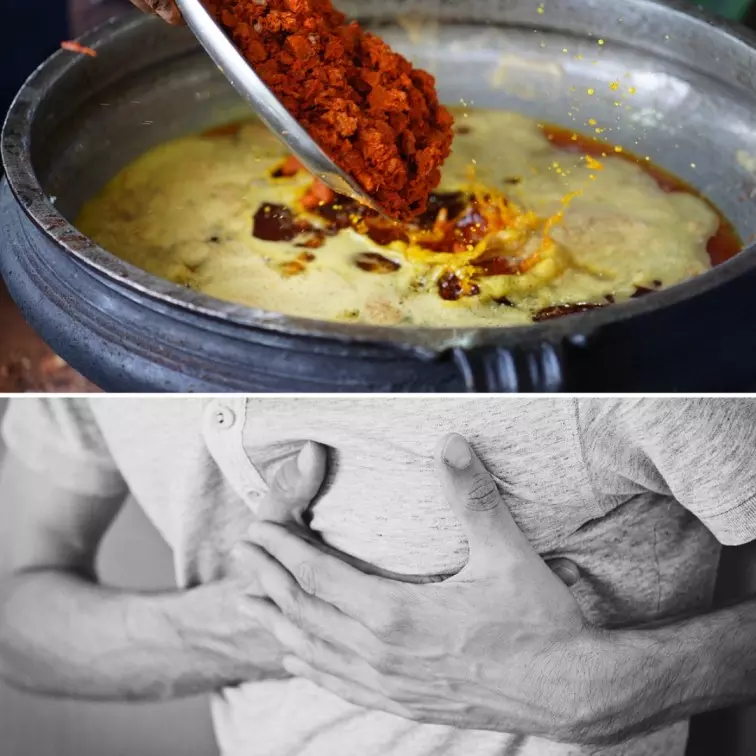FSSAI Arrests 10 Food Outlets In Andhra For Using Fried Oil; Know Health Hazards Of Consuming Reheated Oil
 |
|According to FSSAI guidelines, reheating should be avoided. If it's necessary to reuse the oil, only three times is allowed to prevent the creation of trans-fat, which can increase cholesterol levels, blood pressure, and the risk of heart ailments.
The Food Safety and Standards Authority of India (FSSAI) performed unexpected inspections at a number of hotels, diners, and food outlets throughout Andhra Pradesh to reinforce the implementation and raise awareness about the Re-purpose of Used Cooking Oil (RUCO).
As many as 10 eateries were registered for using fried oil to prepare food. The officials raided 150 hotels and eateries around the state, and complaints under the FSSAI Act were filed against dealers who were found to be reusing oil in excess of permitted amounts.
Regulation Of Used Oil
The FSSAI, for the safety of the consumers' health, has fixed the limit of total polar compounds in fried oil at 25 per cent. Elaborating on this, FSSAI Inspector Gopal Krishna stated, "There will be 5-15 per cent of polar compounds in the unused oil. Once the oil is fried, the polar compound value increases to 20 or 25. It is essential to monitor the quality of vegetable oils during frying. In order to safeguard consumer health, FSSAI has fixed a limit for Total Polar Compounds at 25 per cent, beyond which vegetable oil shall not be used. This will be considered a crime, and cases will be registered", reported The New Indian Express.
To prevent the wastage of used oil, the FSSAI has also made provisions for food joints and restaurants to sell the oil to companies that manufacture bio-diesel. Krishna stated, "Four companies are operating the bio-diesel manufacturing units using used vegetable oil and have collected more than one lakh litres so far".
Health Hazards Of Consuming Used Oil
With almost every individual consuming food from restaurants or food joints quite frequently, it becomes vital to know about the quality of oil that is being used in cooking and the adverse effects that the use of fried oil can have on one's health.
Uttam Mhaske, who runs a fast-food joint outside Pune's Sassoon Hospital, told The Logical Indian, "While in the mornings there's a lot of rush, it dies down by afternoon. So, for an hour or two, we don't use the stuff and just over the frying container. When a customer places an order next, we don't change the oil; just reheat it. It is too expensive to use a new batch of oil every time. How can we manage our livelihood if so much money is spent on oil?" he questions. After using the first batch of oil, he keeps it away from the sunlight and wraps it in a wet jute cloth so that the oil doesn't get contaminated, he adds.
According to FSSAI guidelines, reheating should be avoided, and if it's necessary to reuse the oil, only three times is allowed to prevent the creation of trans-fat.
According to Pune-based nutritionist Dr Pragati Aggarwal, the number of times that food can be reheated depends on the food item that was fried in it, the temperature and duration it was heated to, and the type of oil. Speaking further about the repurposing of oil, she told The Logical Indian, "Every time oil is heated, the fat molecules in it break down a little, a bad odour is released as the oil gradually reaches its smoke point. The speed of the oil reaching its smoke point increases every time it is reheated. This causes the release of hazardous or unhealthy substances in the air, as well as the food that is being fried."
Often, the fats in the oil change into trans fats – a type of harmful fat that increases the risk of heart ailments. Dr Aggarwal adds, "When we reheat the oil, the number of trans fats also increases. This is why regular consumption of fast food is advised against by health professionals." Hence, the consumption of repurposed oil is particularly harmful to those struggling with high-level of cholesterol.
Furthermore, besides the risk of acidity, indigestion and increased blood pressure, the use of reheated cooking oil increases the presence of compounds that are known to cause cancer and inflammation in the body, such as polycyclic aromatic hydrocarbons (PAH) and aldehydes.
